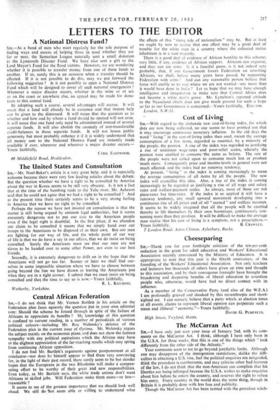Central African Federation
Sta,—I do not think that Mr. Vernon Bartlett in his article on the Federation plan faces squarely the question put in your own editorial note: Should the scheme be forced through in spite of the failure of Africans to appreciate its benefits ? My knowledge of this question is confined to current reading, in a number of periodicals of various political colours—including Mr. Roy Welensky's defence of the Federation plan in the current issue of Optima. Mr. Welensky argues the subject mainly on the economic plane, and does not show the faintest sympathy with any political aspirations which the African may have or the slightest appreciation of the far-reaching results which may spring from continuing African opposition.
I do not find Mr. Bartlett's arguments against postponement at all conclusive—nor does he himself appear to find them very convincing for, in the light of their past record, there surely seem to be but slender hopes that the Europeans in the two Rhodesias will make a compen- sating effort to be worthy of their great and new responsibilities. Even today, as Mr. Bartlett says, the white trade unions don't want Africans irf skilled jobs. Will Federation make them more—or less— reasonable ?
It seems to me of the greatest importance that we should look well ahead. We still do 'tot seem able or willing to tmderstand what
the effects of this "rising tide of nationalism" may be. But at least we ought by now to realise that one effect may be a great deal of trouble for the white man in a country where the coloured native inhabitant is in a vast majority.
There is a good deal of evidence of African hostility to this scheme; very little, if any, evidence of African support. Africans can organise, and they can use arms. Is it a fanciful guess, is it not indeed very probable, that, if our Government forces Federation on unwilling Africans, we shall, before many years have passed, be supporting Federation with arms ? And can any reasonable person believe that force will enable us to step where we are not wanted—any more than it would have done in 1nd:a ? Let us hope that we may have enough intelligence and imagination to make sure that Central Africa does not become a white man's grave. Mr. Lyttelton's reported attitude to the Nyasaland chiefs does not give much ground for such a hope so far as our Government is concerned.—Youis faithfully, ELECTOR.
London, N.W.I1.


































 Previous page
Previous page